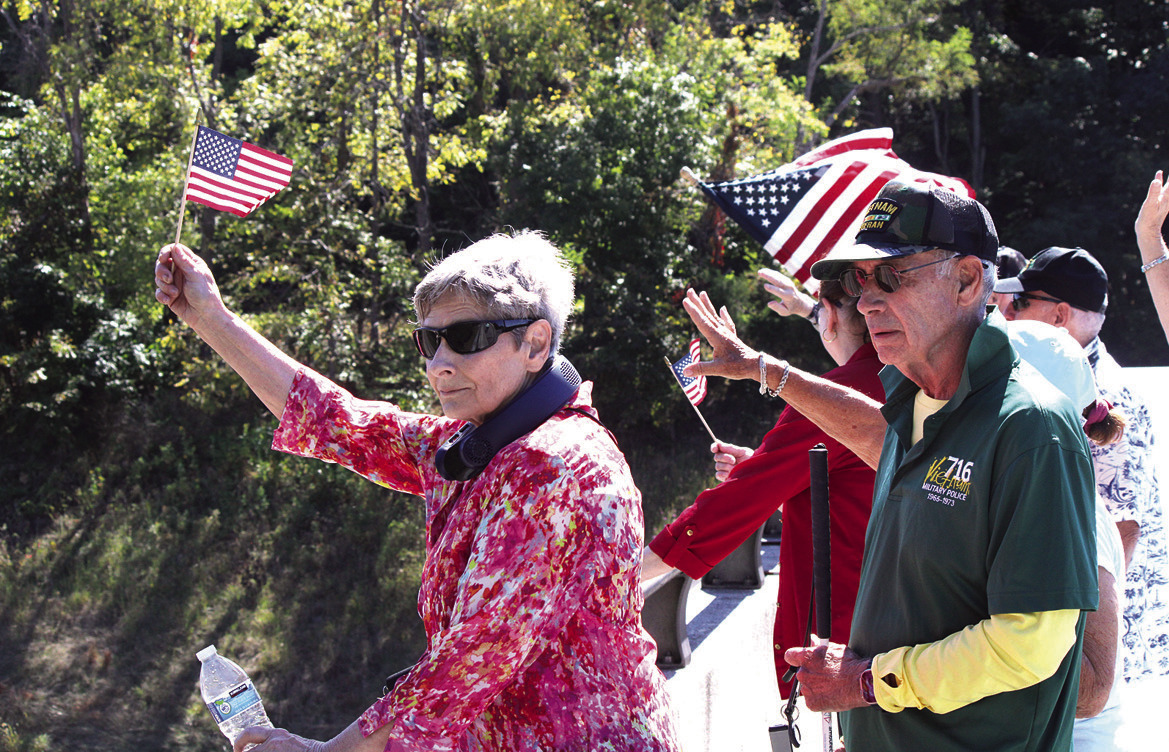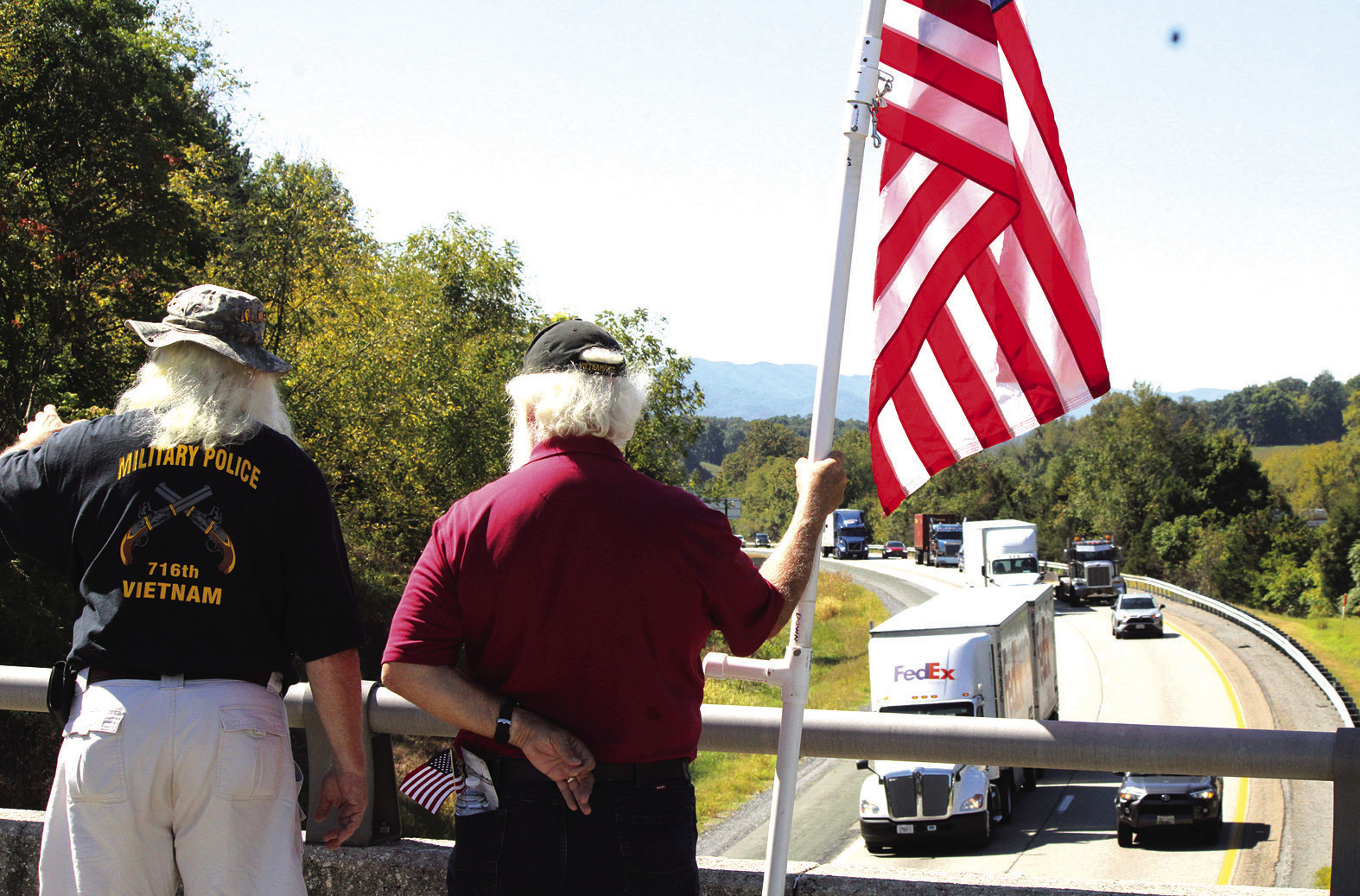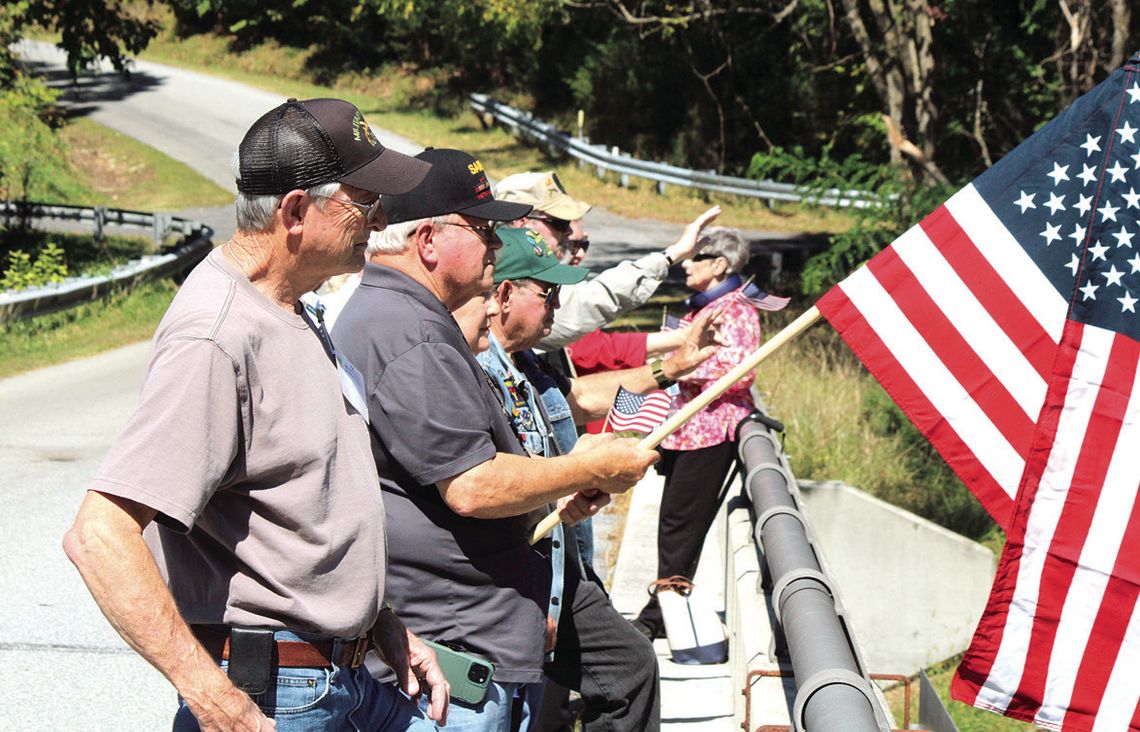MP Unit Fought In Tet Offensive
“That’s all of America right there, coming down the road,” said Jack Key, a veteran of the 716th Military Police Battalion, on Sept. 11, the third and final day of a Lexington-hosted reunion of that celebrated unit.
Key and his compatriots were waving flags on an overpass over Interstate 81 just south of Natural Bridge, and they were thrilled at the response they received from the constant stream of trucks and cars passing underneath.
Key commemorates the anniversary of 9/11 every year by waving flags on an overpass, usually in his home state of Alabama. This year, the date happened to coincide with the battalion’s biennial reunion, taking place for the first time in Rockbridge County.
After meeting and taking photos with the veterans on the bridge, The News-Gazette went to the Natural Bridge Hotel, the “home base” for this year’s reunion, and spoke to local Vietnam veteran Mike Young and others. Young served in the 716th M.P. Battalion and helped organize the event.
Despite this year’s reunion being a smaller, more impromptu affair — around 50 veterans gathered, compared to upwards of 300 in past years — all involved were happy to assemble in a location so rich in American history.

FLAG-WAVING over the freeway to commemorate 9/11 was just one of the events planned for this year’s reunion of the 716th Military Police Battalion, which served in Vietnam. (Scotty Dransfield photo)

JACK KEY (left) waves at vehicles as another veteran holds an American flag as they gather on an Interstate 81 overpass just south of Natural Bridge on Sept. 11. (Scotty Dransfield photo)
“Yes, it’s easy to fall in love with this area. These guys are seeing it,” Young said. “This is just a cross-section of what we do … every two years, we’re getting together for a major reunion,” he explained. “We’ve got members from almost every state.” -The U.S. Army’s 716th Military Police Battalion during the Vietnam War was stationed in Saigon, now known as Ho Chi Minh City, from 1965 to 1973. In a later call with The News-Gazette, Young spoke about the unit’s activity during the war.
“The military police battalion in Saigon was pretty much like a large city police department,” Young explained. “We didn’t police the native Vietnamese, of course, but we had thousands of U.S. Army — all different U.S. military personnel, in fact — in Saigon, because it’s a huge city. And we provided, in effect, the police department, the police force, and the security force for all of those people.”
Young served a 12-month deployment in that unit from February 1967 to February 1968. Just weeks before he was to finish his year-long commitment, on Jan. 31, 1968, Saigon was hit by a surprise attack by the North Vietnamese Army, now known as the Tet Offensive. It was one of the largest military campaigns of the war in Vietnam.
The battalion rose to the occasion, despite not being meant for direct combat. “We were really the only armed unit, battalion-sized unit, in the city, that was capable of doing any kind of defense. And we were not combat soldiers … our job was to be policemen. And we ultimately did a great job defending the city … we stopped them,” Young said.
“We served as the defenders of Saigon during that action. Their attack was planned out well. They came from all sides. They hit a bunch of BOQs and BEQs — BEQs were Bachelor Enlisted Quarters and BOQs were Bachelor Officers Quarters — they hit a bunch of those, tried to blow them up, kill everybody that they could. They overran the radio station; all of our communications were at risk. The U.S. Embassy in Saigon was attacked, and that made big news.”
The actions of the 716th Military Police Battalion that day earned them “a Presidential Unit Citation, which was a pretty significant award,” said Young. “Because we did something that no other MP department, no other MP unit had ever done in wartime, or has ever done since.”
The recognitions this battalion have received for its actions, particularly during the Vietnam War, make them the most decorated military police battalion in the U.S. Army.
Young came to Lexington in 1991 and was the director of public safety for Washington and Lee University for 23 years. Now retired, he’s proud of his connection with the 716th M.P. Battalion and of his participation in the reunions the group tries to hold every two years.
“We were there for eight years. When we get together, we include anybody that ever served there in that period of time. So these guys could’ve been there in ‘71, ‘73, ‘68, whatever. We all did the same thing at the same place, so that’s what makes us special.”
-The decision to hold a smaller, more intimate reunion this year stemmed from a candid acknowledgment of the passage of time.
“Last year we decided, we’re getting too old for this stuff,” Young said at the Natural Bridge Hotel. “Literally. We’re in our 80s, 70s; nobody’s in their 60s anymore.”
Among the veterans at the hotel, the sense of community and mutual support was palpable. Young spoke of the initial difficulties they faced upon returning home from service.
“We were very disappointed in the way we were treated when we came home. The only people we could count on were the people we were there with,” he said.
Yet, despite the challenges, the veterans have found solace and strength in each other’s company.
Young poignantly addressed the lingering effects of Agent Orange, a harsh reality for many Vietnam veterans. Agent Orange was a chemical herbicide used in warfare in Vietnam; aftereffects from exposure to it have caused major health problems and deformities in millions of people during the decades since the war.
“We’re losing people right and left,” Young said. “Agent Orange is killing people, every day. I’d say that probably 60%, if not more than that, were affected by that …. you know, people wonder why you don’t trust the federal government. It only took them about 40 years to decide that ‘maybe we made a mistake on this stuff.’ And then they didn’t want to pay! But we are who we are. God looks after us enough to keep us together a little while longer.”
The decision to continue the tradition of these reunions has been tentative, but unanimous. Young shared the group’s evolving plans, noting that “we had decided to give it up, and we’re now rethinking that and what we’re going to do. Won’t be here, because it would never hold everybody, but we may go back to the Midwest. Benny Childers is going to be the new leader of this group.”
In his new role, veteran Benny Childers is determined to keep the spirit of the reunions alive. “I don’t want to see it fade away. It’s done such good for me,” he said.
For Childers, attending his first reunion in 2016 was a transformative experience. “I didn’t know about it; I found out in 2016. That was my very first reunion. And I told my wife, ‘They went to all this trouble looking me up, I think I owe it to them just to show up and see what it’s about,’ not knowing if I was going to see anybody I knew or not. It was in Omaha, Nebraska. And I was sitting at a table, like this, by myself, and here comes Sid Turner up there — he and I rode together, was on the same team — and we have connected after 50 years. And we have not released that connection yet. We see each other every year.”
Childers’ experience is a testament to the profound impact these reunions can have.
“Going to that reunion has been life-changing for me, for the better, and I can’t thank these guys enough for putting them on,” he said.
”It’s the best thing I do,” Young agreed.
.jpg)



